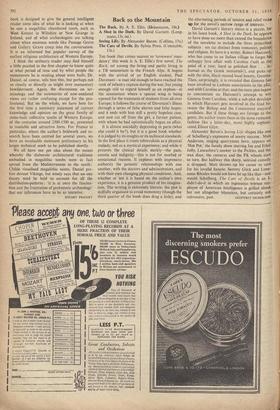Back to the Mountain
THE book that comes nearest to 'reviewers' man- datory' this week is A. E. Ellis's first novel, The Rack, set among the living and partly living in a TB sanatorium in the French Alps. It begins with the arrival of an English student, Paul Davenant—a man old enough to have reached the rank of infantry captain during the war, but young enough still to regard himself as an orphan—at the sanatorium where a special wing is being opened for the treatment of students from all over Europe; it follows the course of Davenant's illness through a series of false alarms and false hopes; and it ends with him still a pretty hopeless case, and now cut off from the girl, a former patient, with whom he had optimistically begun an affair.
It is almost suicidally depressing in parts (what else could it be?), but it is a good book whether it is judged by its insights or its technical standards. In the first place it treats tuberculosis as a physical malady, not as a mystical experience; and while it presents the clinical details starkly—the pain„ nausea and indignity—this is not for morbid or sensational reasons. It explores with impressive authority the patients' relationships with one another, with the doctors and administrators, and with their own changing physical conditions. And, whether or not it is based on the author's own experience, it is a genuine product of his imagina- tion. The writing is extremely literate; the plot is skilfully organised to avoid monotony (though the third quarter of the book does drag a little); and the alternating periods of tension and relief make up for the novel's narrow range of interests.
David Garnett's literary status is a puzzle, for in his latest book, A Shot in the Dark, he appears to have done no more than extend the boundaries of the novelette to include the three proscribed subjects : sex (as distinct from romance), politics and religion. Its hero is a writer, Robert Harcourt, who has come to an Italian village to forget I is unhappy love affair with Caroline (`soft as the petal of a rose; hard as polished flint . . . in- human as the Greek immortals'), and picks UP with the slim, black-maned local beauty, Gemma. Then, surprisingly, it is revealed that Gemma has been involved in Lesbian associations in The past, and with Caroline at that; and the main plot begins to concentrate on Harcourt's attempt to win Gemma from Caroline, while a sub-plot develops in which Harcourt gets involved in the feud be- tween the Bishop and the Communist mayoral candidate. But if these things are foreign to Id e genre, the author treats them in the same romantic fashion like a latter-day, more highly sophisti- cated, Elinor Glyn.
Alexander Baron's Seeing Life shapes like one of Schulberg's exposures of seamy success : Matt Anderson, singing quarryman hero, appears on `Hot Pot,' the family show starring Joe and Ethel Jolly, Lancashire's answer to the Pickles, and the wax discs, the cameras and the PR wheels start to turn. But halfway this sharp, ,satirical comedy is dropped; Matt throws up his career to care for his invalid fiancée. Sammy Glick and Lone- some Rhodes would not have let up like that—nor would Schulberg. The Care of Devils is an I- didn't-do-it in which an ingenuous woman em- ployee of American Intelligence is grilled about her not altogether blameless, but certainly 11, t


































 Previous page
Previous page